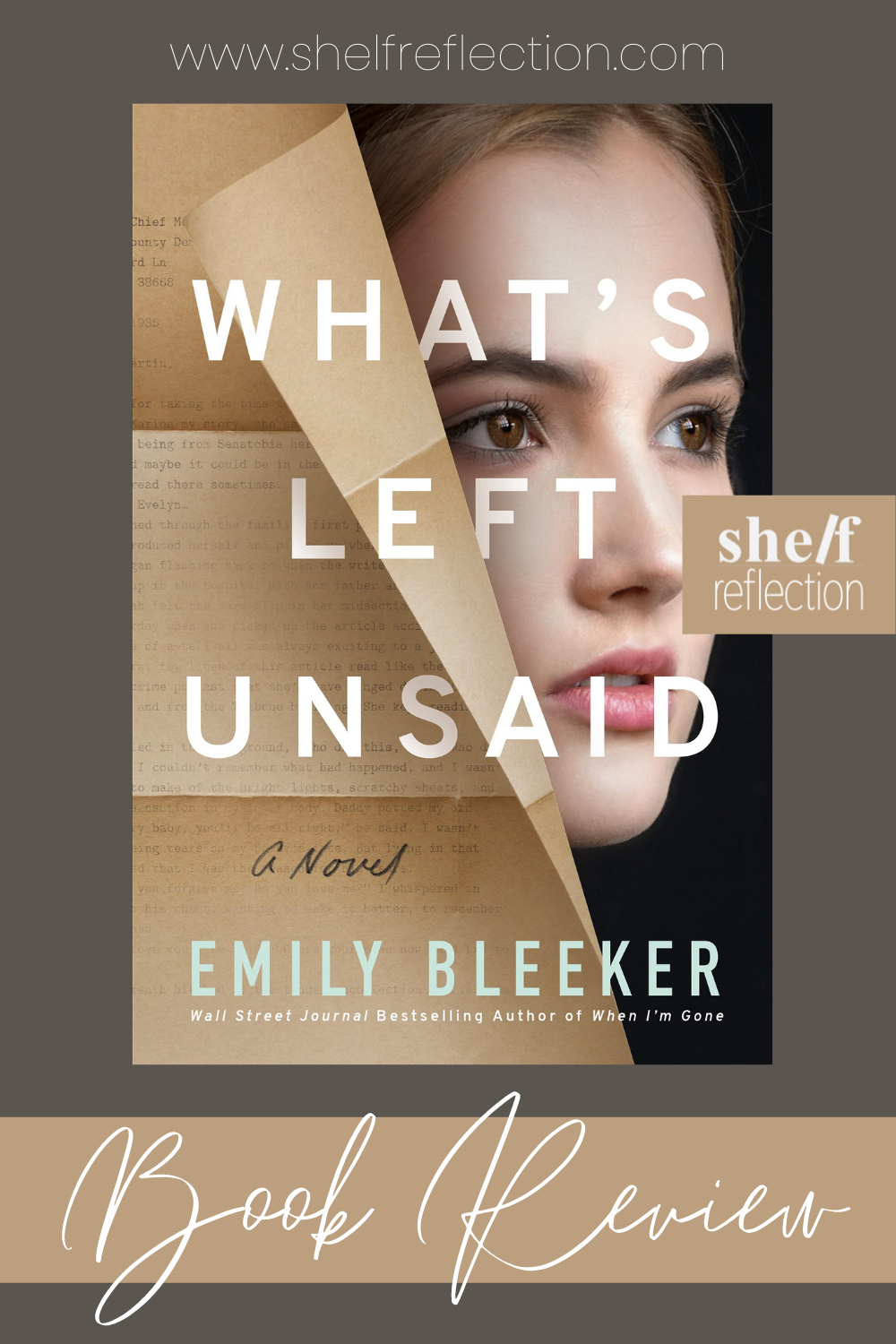What’s Left Unsaid
What’s Left Unsaid
By: Emily Bleeker
“Sometimes one person’s mistakes set off a shock wave of devastation in the lives of those around them.”
In 2018 I read Bleeker’s book, When I’m Gone, and really enjoyed it! I finally got around to reading another one of her books.
Unfortunately, this was one didn’t hit the mark for me.
What’s Left Unsaid is similar to When I’m Gone in that both have a strong focus on letters— the latter to a husband from his deceased wife, the former found by a journalist about a dead woman’s rejected and unpublished ‘story’ mailed to the newspaper office decades before.
I think When I’m Gone created more investment and emotional connection for the reader because of the intimate relationship between a husband and wife and it was a scenario that resonated with me.
What’s Left Unsaid created mystery, for sure— Evelyn (the letter writer) lets us know that she was shot in the chest and damage to her spinal cord has left her in a wheelchair. She wants her story known so she can reveal who the shooter was. She sends chunks of her story monthly so Hannah (the journalist) finds the various letters over a period of time and pieces it together.
So what made this book ‘meh’ for me?
I think some of it is because I found the main character, Hannah, unlikable. I think the author intentionally wrote her flawed— selfish and condescending yet broken and dealing with severe depression— to show character growth and shed light on the struggles of depression and how one views herself. (The Midnight Library does a better job exploring this concept.) But I had a hard time getting past her ‘woke-ness’ in her constant judging of the South and its people as she had just temporarily moved down from Chicago.
The author’s attempt to incorporate the discussion of systemic racism, privilege, the #metoo movement, and women’s independence overshadows the mystery and becomes the main driving factor in this book.
I think some people might appreciate and enjoy this combination. For me, I wasn’t expecting it and it got to be a bit much. I don’t personally know what the South is like, maybe this book portrays it accurately. But Hannah’s constant condescension and her going about her life without any regard of how her choices affect other people frustrated me.
Here are some snippets that shed some light on Hannah’s disposition:
“…awkward topics of conversation like she’d been born south of the Mason-Dixon Line.”
“Hannah almost understood how a homemaker’s life could bring moments of fulfillment.” (I really hope this doesn’t portray the author’s POV on homemakers… haha… man, us homemakers really hold out for those rare moments of fulfillment. What an existence.)
“‘I should get you home,’ he said, sounding a little too much like a southern gentleman making sure a vulnerable lady wasn’t out past dark to ‘protect her reputation.’”
“…since the poisonous effects of discrimination turned out to be everywhere, even if the symptoms looked different.”
Someone comments that it was hard to believe a picture was taken a hundred years ago and Hannah says: “Well, not exactly. Ninety years is more like it.” (This might have been an attempt at flirting but it’s more so pretentious.)
“‘Why does everyone hide from sad things down here?’”
“He stuttered again, going through a list he must’ve created inside his head but also seeming to find it difficult to stay angry at a tearful young woman. She should be offended, but she was grateful for the one time misogyny was working in her favor.”
Hannah’s selfishness also shows in her swearing all the time, even doing so when she knows others are bothered by it because she feels it’s her job to ‘free’ them from their beliefs or she thinks it’s funny for others to feel ‘scandalized.’
Hannah tells a lot of ‘jokes’ in this book but Bleeker always comments about it instead of letting the humor stand on its own. She makes sure to include if others laughed at her joke or if Hannah rolls her eyes at her own joke or if Hannah thinks internally about her jokes. Plus the jokes really aren’t that funny and her sarcasm isn’t very clever.
There is a whole segment about her morbidly coming up with ‘good’ names for a crime documentary about her own death and none of them are original.
The whole premise of the letters was a bit odd. I’m not sure why Evelyn wanted to break up her story so much and think that the newspaper would publish segments of it without knowing the full story right off the bat. And every time Hannah reads the letters she applies every detail to her own life. This ends up being significant but I was kinda annoyed because I would have rather heard more from Evelyn than from Hannah.
I know most of my comments have been negative. I don’t think it’s a bad book. I think it just didn’t do much for me. I think there are a lot of readers who will enjoy this book. If you can get past the character flaws and be able to appreciate the growth and the woke-ness, the mystery and the ending are at least satisfactory and keep it interesting. Plus the letter part of the story is based on Bleeker’s own family members which adds to its authenticity.
And if you really like books about journalists finding old letters in newspaper offices, check out Jojo Moyes book, The Last Letter from Your Lover. (I also didn’t like this one though…)
P.S. It’s not just a Southern thing to call it P.E. instead of Gym. I’m from Iowa and we called it P.E. I feel like ‘Gym’ is just for the coasts? Plus Chicago? What do YOU call it everyone???
**Received an ARC via NetGalley**
Pin this review to Pinterest!


